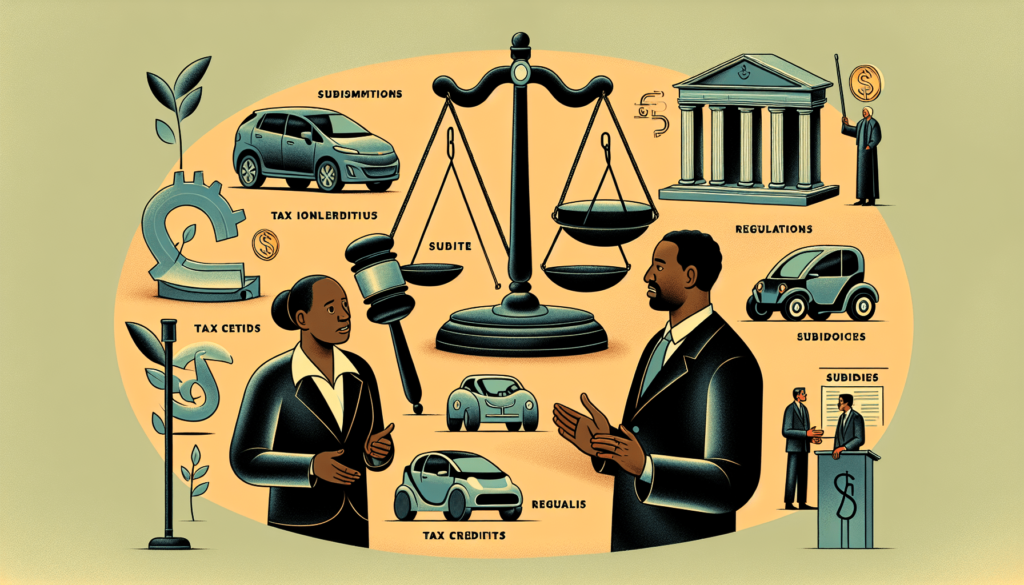Imagine a world where electric vehicles (EVs) are not only affordable but also readily available. Have you ever wondered how governments play a crucial role in making this vision a reality? In this article, we will explore the significant impact that governments have on setting EV pricing standards. From incentivizing manufacturers to reducing taxes, their involvement dictates the course of EV affordability and accessibility. So grab a cup of coffee, sit back, and let’s dive into the fascinating world of government influence on EV pricing.

Introduction
EV pricing standards refer to the regulations and guidelines set by governments to determine the pricing of electric vehicles (EVs). These standards aim to establish a fair and transparent market for EVs, ensuring that consumers can make informed decisions and promoting the adoption of sustainable transportation. The importance of governments’ role in setting these pricing standards cannot be overstated, as they have a major influence on the affordability, accessibility, and environmental impact of EVs. This article will provide an overview of the development of EV pricing policies and regulations, the incentives and subsidies offered by governments to promote EV adoption, the environmental considerations in setting pricing standards, strategies to ensure affordability and accessibility, collaboration with industry stakeholders, international cooperation, consumer protection measures, and the monitoring and enforcement of pricing standards.
Policy and Regulation
The development of policies and regulations is crucial in setting EV pricing standards. Governments have the responsibility to create a supportive regulatory environment that encourages the growth of the EV market. This includes establishing pricing benchmarks to ensure fair competition among EV manufacturers. By setting clear guidelines for pricing, governments can prevent monopolistic practices and promote a competitive market for EVs. Additionally, governments can play a vital role in ensuring that EV pricing is aligned with the costs of production and technological advancements, thereby enabling a sustainable market for EVs.
Incentives and Subsidies
Financial incentives and subsidies are essential tools that governments utilize to promote the adoption of EVs. Providing financial support to EV manufacturers encourages innovation and investment in the sector. These incentives can include grants, low-cost loans, and tax credits, which help manufacturers reduce their production costs and make EVs more price competitive with traditional vehicles. Furthermore, governments often offer consumer subsidies to incentivize individuals to purchase EVs. These subsidies can take the form of purchase discounts, tax rebates, or exemption from congestion charges, making EVs more affordable and attractive to consumers. By implementing such measures, governments aim to accelerate the transition to sustainable transportation.
Environmental Considerations
Governments play a crucial role in reducing carbon emissions, and promoting the adoption of EVs is a key strategy in this effort. By setting pricing standards that incentivize the purchase of EVs over traditional vehicles, governments can drive the transition to clean and sustainable transportation. Setting higher prices for carbon-intensive vehicles and providing financial incentives for EVs can encourage consumers to choose environmentally friendly options. Additionally, governments can establish policies that require EV manufacturers to meet certain emissions standards, promoting the development and production of more energy-efficient and eco-friendly vehicles.

Ensuring Affordability and Accessibility
Making EVs affordable and accessible to a wide range of consumers is vital for widespread adoption. Governments can implement initiatives to reduce the cost of EVs, such as providing grants or subsidies to manufacturers to lower the production costs. Addressing pricing disparities between EVs and traditional vehicles is also crucial. Governments can implement policies that reduce taxes or provide additional incentives to make EVs more cost-competitive. Furthermore, expanding the charging infrastructure is essential to ensure accessibility. Governments can invest in charging stations and create a comprehensive network of charging points, making it easier for consumers to charge their EVs wherever they go.
Collaboration with Industry Stakeholders
Consultation with automakers and industry experts is crucial in setting effective pricing standards for EVs. Governments need to gather input from manufacturers and experts to understand the dynamics of the EV market, including production costs, technological advancements, and consumer preferences. By working closely with industry stakeholders, governments can ensure that the pricing standards are fair, realistic, and align with the interests of the industry. Public-private partnerships can also play a significant role in setting pricing standards, as they bring together the expertise and resources of both sectors. Balancing the interests of the industry with public welfare is essential for the sustainable growth of the EV market.

International Cooperation
Harmonizing EV pricing standards globally is essential for the growth of the EV market and the reduction of carbon emissions on a global scale. By learning from successful international models, governments can adopt best practices and avoid reinventing the wheel. International cooperation allows for the exchange of information, research findings, and policy strategies, benefiting all countries involved. This collaboration can help identify common challenges and develop solutions that ensure a level playing field for EV manufacturers worldwide. By working together, governments can create a global market that fosters innovation, supports sustainable transportation, and mitigates environmental impacts.
Consumer Protection
Governments have a responsibility to protect consumers from unfair pricing practices by EV manufacturers. Price gouging, where manufacturers increase the prices of EVs beyond reasonable levels, can deter consumers from purchasing these vehicles. Governments can implement regulations and oversight mechanisms to prevent price gouging and ensure that EV prices are fair and transparent. In addition, governments can regulate warranty and service costs to ensure that consumers are not burdened with expensive repairs and maintenance. Providing accurate pricing information and promoting transparency in pricing are essential for consumer confidence and the growth of the EV market.

Monitoring and Enforcement
Tracking adherence to pricing standards and enforcing penalties for non-compliance are crucial aspects of effective EV pricing regulations. Governments need to establish monitoring systems that ensure EV manufacturers comply with the set pricing standards. If non-compliance is identified, appropriate penalties should be imposed to discourage unfair practices and maintain a level playing field. Regular evaluation and updating of pricing policies are also necessary to keep pace with technological advancements, changing market dynamics, and consumer demands. By continuously monitoring and enforcing pricing standards, governments can safeguard the interests of consumers and maintain a fair and competitive EV market.
Conclusion
Governments play a vital role in setting EV pricing standards to promote a sustainable and affordable market for electric vehicles. Through the development of policies and regulations, governments establish pricing benchmarks, ensure fair competition, and align pricing with production costs and technological advancements. Financial incentives and subsidies provided by governments encourage the growth of the EV market and promote consumer adoption. Environmental considerations are integrated into pricing standards to reduce carbon emissions and drive the transition to clean transportation. Governments also focus on ensuring affordability and accessibility, collaborating with industry stakeholders and promoting international cooperation. Consumer protection measures, monitoring, and enforcement of pricing standards contribute to a fair and transparent EV market. By working together, governments, industry stakeholders, and consumers can create a sustainable and affordable EV market that benefits society, the economy, and the environment. Though challenges exist, the future prospects for the EV market are promising, with governments playing a crucial role in shaping its growth and development.


